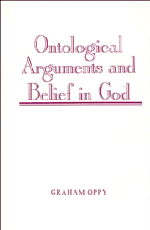Book contents
- Frontmatter
- Contents
- Preface
- Acknowledgments
- Ontological arguments and belief in God
- Introduction
- 1 Some historical considerations
- 2 Definitional arguments
- 3 Conceptual arguments
- 4 Modal arguments
- 5 Meinongian arguments
- 6 Experiential arguments
- 7 “Hegelian” arguments
- 8 Application to historical arguments
- 9 Are there (other) global objections to ontological arguments?
- 10 Is existence a predicate?
- 11 The uses of parody
- 12 Are ontological arguments of any use to theists and/or atheists?
- Conclusion
- Literature notes
- Bibliography
- Index
12 - Are ontological arguments of any use to theists and/or atheists?
Published online by Cambridge University Press: 05 May 2010
- Frontmatter
- Contents
- Preface
- Acknowledgments
- Ontological arguments and belief in God
- Introduction
- 1 Some historical considerations
- 2 Definitional arguments
- 3 Conceptual arguments
- 4 Modal arguments
- 5 Meinongian arguments
- 6 Experiential arguments
- 7 “Hegelian” arguments
- 8 Application to historical arguments
- 9 Are there (other) global objections to ontological arguments?
- 10 Is existence a predicate?
- 11 The uses of parody
- 12 Are ontological arguments of any use to theists and/or atheists?
- Conclusion
- Literature notes
- Bibliography
- Index
Summary
Despite the negative conclusions that can be drawn about the utility of ontological arguments as instruments of persuasion, some theists and atheists continue to see value in some types of ontological arguments. In particular, some theists hold that ontological arguments can be used to demonstrate certain facts about the rationality of their beliefs: namely, either (i) that theism is rational, (ii) that nontheism is unintelligible, or (iii) that theism is absolutely epistemically secure. Similar positions can be occupied by atheists. In this chapter, I shall concentrate on defenses that have been offered for the theistic views (i)-(iii); exactly parallel considerations will apply to the atheistic counterparts, but will go unmentioned.
There is one unproblematic possible use for ontological arguments that can be conceded from the outset. It might be that some ontological arguments - for example, ontological arguments involving necessity - can have a use in the systematic exposition of theistic positions. There can be no objection to the use of dialectically inefficacious proofs in the exposition of a view - for the aims of exposition and dialectic are very different. However, once this has been conceded, it should be noted that it seems very implausible to think that it is actually the case that the arguments discussed in the earlier part of this book are suitable candidates for such roles. A straightforward exposition of theism surely ought to begin with the assertion that God exists - rather than, for example, the assertion that it is possible that God exists - since this provides a more immediate picture of the commitments of the view.
- Type
- Chapter
- Information
- Ontological Arguments and Belief in God , pp. 186 - 197Publisher: Cambridge University PressPrint publication year: 1996



